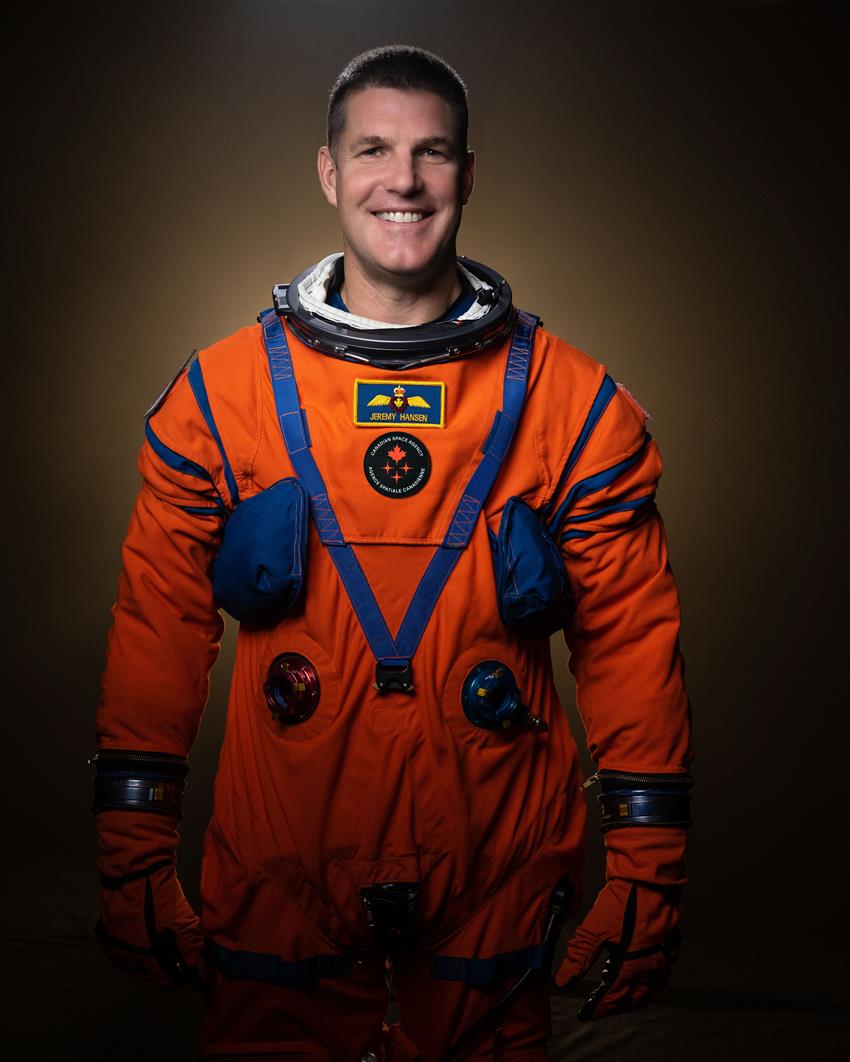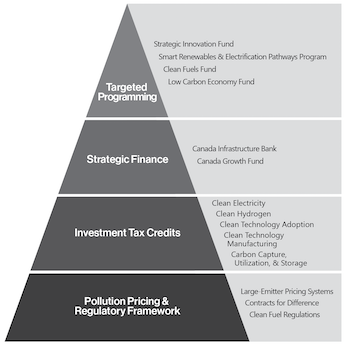The Short Report – April 5, 2023: Turning waste into biofuels, huge foreign investment in Montreal, new governance for federal research, pausing AI development, Canada’s lunar astronaut, and more
Jeremy Hansen, selected as first Canadian astronaut to fly around the Moon, as part of NASA's Artemis II mission.
GOVERNMENT FUNDING
The Canada Infrastructure Bank (CIB) provided a $277-million loan to the Varennes Carbon Recycling project in Varennes, Quebec. The joint venture, involving Shell, Suncor Energy, Swiss natural gas firm Proman and the Government of Quebec, is building one of the world’s first large-scale biorefineries coupled with an electrolyzer, to convert 200,000 tonnes of landfill and wood waste annually into as much as 130 million litres of biofuels. The facility is expected to cut more than 170,000 tonnes of greenhouse gas emissions annually — equivalent to taking 50,000 passenger vehicles off the road. Expected to be operational in 2025, the facility will utilize a thermochemical technology developed by Enerkem and used at its waste-to-biofuels Edmonton facility. CIB
The Government of Canada and the Government of Quebec, along with the Ville de Montréal, provided grants totalling $48 million to the École de technologie supérieure to support the creation in Montreal of Ax-C, a space for innovative entrepreneurship. The project, valued at more than $100 million, will be located in the heart of the metropolis’s business centre and close to universities. The federal contribution of $7 million, through the Canada Economic Development for Quebec Regions’ Regional Economic Growth through Innovation program, is to develop the space and purchase specialized equipment. The Quebec government is providing $38.5 million in grants through the 2022-2027 Quebec strategy to support research and investment in innovation. In addition, the Ville de Montréal is granting $2.5 million. The city’s support is part of Stratégie Montréal 2030, which emphasizes innovation and collaboration as key drivers of the economy of the future. Govt of Canada
The Government of Canada and the Government of Quebec signed an agreement under the new Sustainable Canadian Agricultural Partnership. The agreement includes a joint investment by the governments estimated at $955 million in the Quebec agri-food sector over the next five years. This is an additional $97 million in funding compared with the previous strategic framework, for cost-shared strategic initiatives. Agriculture and Agri-Food Canada
The Natural Sciences and Engineering Research Council of Canada and the Social Sciences and Humanities Research Council issued their first call for funding under the NSERC-SSHRC Sustainable agriculture initiative, in collaboration with Agriculture and Agri-Food Canada. Up to $72 million is being offered in this first call. Eligible Canadian university researchers and their collaborating organizations are offered $500,000 to $2 million per year to support research to initiate or accelerate development of solutions for a sustainable, resilient and profitable agriculture sector in a net-zero economy. NSERC
The Government of Alberta, through Alberta Innovates, invested $30 million in the Alberta Machine Intelligence Institute (Amii) based at the University of Alberta. The funding will be used to build Alberta’s talent pipeline in artificial intelligence and accelerate research and commercialization. Amii is one of three national AI institutes in Canada. The other two are Mila in Montreal and the Vector Institute in Toronto. Govt of Alberta
Quebec City-based lending group Evol received two financial contributions totalling $9.47 million from Canadian Economic Development (CED) to support women and men entrepreneurs from under-represented groups. Evol specializes in funding and mentoring for diverse, inclusive businesses across Quebec. An initial non–repayable contribution of $4,475,800 will enable Evol to provide ongoing, personalized mentoring to businesses that have a diverse clientele, including women, as well as a sustainable development component. A second repayable contribution of $5 million will be used to provide early-stage funding for entrepreneurs from under-represented groups in Quebec's economy. CED
The Government of British Columbia’s Innovative Clean Energy Fund provided a total of $7 million to seven pre-commercial clean technology projects in the ocean-based sector. Victoria-based Open Ocean Robotics received $1.75 million to develop solar-powered, uncrewed surface vehicles with sensors, cameras and communication devices that can capture information from anywhere on the ocean and relay it to researchers instantly. The South Island Prosperity Partnership’s Centre for Ocean Applied Sustainable Technologies received $2 million to serve as a catalyst and cluster facilitator for the blue economy along B.C.’s coastline. Govt of BC
Canada’s Ocean Supercluster (OCS) is contributing $6.7 million to the $14.1-million Oneka Glacier Project – Utility-Scale Wave Powered Sustainable Desalination, led by Oneka Technologies based in Sherbrooke, Quebec. Oneka will scale up its wave-powered desalination technology to utility-scale, creating a desalination “Glacier” system to make the ocean a sustainable and affordable source of freshwater. Oneka will work with project partners shipbuilder AF Theriault (Nova Scotia) which is supporting the manufacturing the hull and structure of the Glaciers; H2O Innovation (Calgary) which is providing the process plant for the desalination portion of the Glacier technology; and the City of Barrington, N.S., which will provide a coastal site for buoy installation at Cape Sable Island. OSC
The Canada Foundation for Innovation launched a new feature on Innovation.ca to help visitors delve further into the extent of CFI’s investments in Canada’s research enterprise. The new funded projects dashboard showcases the more than 12,500 research infrastructure projects CFI has funded over the past 25 years. The investment amounts to nearly $10 billion in projects at 172 research institutions in 80 municipalities across Canada. The dashboard allows visitors to:
- See a summary of CFI investments, including project name, total contribution, institution, funding competition and year of award;
- Scroll over a map view that breaks down funding by province and territory; and
- Search through the infrastructure projects CFI has supported and filter the results by field of research, institution or funding competition. CFI
RESEARCH, TECH NEWS & COLLABORATIONS
UNESCO, a scientific agency of the United Nations, announced the creation of the UNESCO Chair in Mountain Water Sustainability to be hosted by the University of Calgary. The Chair will be co-held by six international world-class water researchers, including two from UCalgary and two from the University of Saskatchewan. The chairholders will work collectively to improve how we forecast the impact of climate warming on water sources, develop new climate change mitigation measures, and increase the resilience of communities reliant on mountain waters. UCalgary
The University of Waterloo sent an email to its researchers, faculty and graduate students advising them what to do if approached by an agent from the Canadian Security Intelligence Service (CSIS). The email advises that they have no legal obligation to talk to a CSIS agent and that a search of university property, including any equipment purchased with research grant funding, isn’t allowed unless the university authorizes it. University of Waterloo has published more than 150 papers with researchers connected to China’s military, according to Waterloo cybersecurity expert Ryan Westman. The university’s administration said the email is one piece of a larger strategy being developed to support faculty in safeguarding research. CTV News
The Government of Alberta approved the University of Alberta to establish an Innovation Fund, which will be a separate for-profit subsidiary. The fund will empower U of A and other entrepreneurs to access capital, educational programming, mentoring and strategic global networks. The Innovation Fund, expected to be launched this year, will invest in Alberta-based startups founded by U of A students, alumni, faculty, staff and Alberta entrepreneurs. The fund would invest in ventures in return for equity, with all returns going back into the Innovation Fund or to a sustainable capital pool for the future. Alberta
Urban innovation hub MaRS Discovery District launched the Growth Acceleration Program, a multi-sector initiative designed to support executives of scaling, high-growth companies on track to reach $20 million in revenue. The program, funded by FedDev Ontario, is for ventures with total funding $10 to $20 million and/or annual recurring revenue of $5 million to $20 million that have a core product in the market with traction beyond early customers. The program supports ventures within the Canadian ecosystem on their sales and marketing, revenue growth, and talent development through expert advisory, data tools, and community building opportunities. MaRS
Montreal-based startup RenoRun filed for creditor protection in Quebec, as the e-commerce company for delivery of construction and building materials seeks to restructure itself. The move comes a little over a year after RenoRun raised US$142 million — the fourth-largest Series B round in Canadian history — to fuel rapid expansion across the U.S. and Canada. RenoRun was one of 61 companies named to Communitech’s Team True North of Canadian high-performing tech firms tracking to $1 billion in annual revenue with growth rates that match the top one per cent of companies in the world. However, RenoRun was unable to raise needed capital, despite numerous attempts over the past nine months. The insolvent company has amassed debts of more than $51 million with at least 52 creditors, plus employees, according to a document filed under the Bankruptcy and Insolvency Act. G&M, The Logic
Thirty-one percent of technology startups have at least one female founder, but the average proportion of female founders in the worldwide tech ecosystem is just 15 percent, according to a survey of tech startups and scalable ventures by San Francisco-based Startup Genome. The company surveyed 5,469 respondents across 67 global ecosystems between September 2016 and November 2022, with only Brisbane and Manila reporting more than 50 percent of startups having one or more female founders (72 percent and 52.6 percent respectively). Coming in close behind were Chicago (46 percent), New Zealand (45 percent) Dublin 42 percent), Detroit (41 percent), and Halifax, N.S. (40 percent). Startup Genome
ARC Clean Technology Canada Inc. and Invest Alberta Corporation, a Crown corporation of the Government of Alberta, signed a memorandum of understanding to jointly pursue activities to support Alberta-based commercialization of ARC’s advanced small modular reactor (aSMR) technology, the ARC-100. Under the MOU, ARC will begin the process to expand its operations in the province, with the objective of developing a fleet of ARC-100 reactors. According to ARC, applications for the ARC-100, a sodium-cooled fast reactor capable of producing 100 megawatts of electricity, include the decarbonization of heavy industry (including oil sands extraction, chemical production, refining, mining, and water treatment and desalinization), the fueling of low-carbon hydrogen projects, and the creation of medical isotopes. The Washington, D.C.-headquartered company previously established its first Canadian office in Saint John, N.B, where it plans to deploy the first grid-scale aSMR in Canada at the Point Lepreau Nuclear Generating Station, owned by New Brunswick Power, by the end of the decade. ARC Clean Technology
Li-Cycle Holdings Corp., a Toronto-based lithium-ion battery recycling firm, signed an agreement for a global lithium-ion battery recycling partnership with the KION Group, a German industrial trucking multinational. Li-Cycle will recycle lithium-ion batteries from KION’s global brands using a proprietary and innovative submerged shredding technology. Li-Cycle plans to develop a new lithium-ion battery recycling facility in the Hauts-de-France region in northern France, where plans to build three battery “gigafactories” have recently been announced. Li-Cycle’s facility, expected to become operational in 2024, will have initial processing capacity of up to 10,000 tonnes of lithium-ion battery material per year. Li-Cycle
Shareholders approved a $1.8-billion buyout of Waterloo-based Magnet Forensics by U.S. private equity firm Thoma Bravo. The deal, which still needs regulatory and court approval, would be the biggest exit in Waterloo Region tech history and comes less than two years after Magnet went public on the Toronto Stock Exchange. Thoma Bravo plans to take Magnet private and merge it with another digital-investigations company, Grayshift LLC of Atlanta, Georgia. As part of the takeover agreement, Magnet founder Jad Saliba and CEO Adam Belsher will each hold “critical leadership” positions in the combined company, and Magnet Board Chair Jim Balsillie will serve on the new board. Communitech
BlackBerry Ltd. has agreed to sell most of its legacy smartphone patents for an upfront payment of US$170-million in a deal the Waterloo, Ont.-based company said could be worth as much as US$900-million. The deal marks the second attempt by the data communications pioneer to offload the bulk of its intellectual property, after a US$600-million sale fell apart last year. BlackBerry has sold about 32,000 patents and applications related primarily to mobile devices, messaging and wireless networking to a subsidiary of Key Patent Innovations, a Dublin-based company that seeks to extract value from other companies by asserting they are using its patented technology, typically by pursuing licensing agreements with other operating companies. G&M
VC & PRIVATE INVESTMENT
Foreign direct investment (FDI) in Greater Montreal hit record highs in 2022, according to figures released by Montreal International, the area’s economic promotion agency. The 12 months of 2022 saw a record 102 new FDI projects — with investments coming from 22 countries — with a combined value of $3.58 billion, creating a total of 8,287 jobs with an average salary of more than $88,000. Life sciences and health technologies saw 12 new FDI projects in 2022 with a combined value of $684.7 million, rising by 143.76 percent from 2021’s total. Life sciences and health technologies outperformed Montreal’s well-established video games industry in terms of FDI, which took a 13 percent share. Montreal’s IT sector also continues to attract foreign investment. In 2022, data storage and analytics attracted 9 percent of all FDI in Montreal, with another 9 percent for IT services, and software receiving 7 percent. Investment Monitor
British Columbia saw local venture funding fall by more than two-thirds in 2022, according to a report by briefed.in, which is owned by Communitech. Startups in B.C. raised a total of $1.3 billion in 2022, down by 67.5 percent from 2021, but up by 34 percent from 2020. Of all the Canadian tech regions tracked by briefed.in, B.C. saw the most significant year-over-year decline in funding. briefed.in tracked a total of 72 deals in B.C. during 2022, which is close to half of the 140 deals in 2021 and a 35 percent decrease from the 111 deals closed in 2020. B.C. startups still managed to collectively raise more money in 2022 than in 2020, following the trends of ecosystems like Toronto and Waterloo Region. The Waterloo Region tech ecosystem saw total investment drop to about $856 million in 2022, compared with $1.4 billion in 2021. Across Canada, total investment in Canadian companies dropped to $9.7 billion in 2022, down from $14 billion in 2021. BetaKit, briefed.in
Nulogy, a Toronto-based provider of supply chain collaboration solutions, raised a total of $20 million from Export Development Canada and incremental working capital from a Tier 1 Canadian bank, which was not named. The funds will be used for product innovations and to accelerate the growth of Nulogy’s cloud-based, multi-enterprise supply chain platform and solutions. The company’s technology allows suppliers, manufacturers and distributors to collaborate on one platform to monitor and manage orders in “near real time.” Nulogy
Vertu Capital, a Toronto-based private equity firm specializing in global enterprise software companies, closed its inaugural fund, Vertu Partners Fund I, with more than $300 million in capital commitments. Vertu received support from a diverse range of Canadian and U.S. institutional investors including New York State Common Retirement Fund, BDC Capital, BMO Capital Partners, funds managed by BMO Global Asset Management, CIBC, Export Development Canada, and Manulife Investment Management, as well as several established asset managers, family offices, and industry executives. Vertu Capital was founded in 2017 by Lisa Melchior, a leading private equity technology investor in Canada. Vertu Capital
Vancouver-based startup pH7 Technologies Inc., a developer of clean and sustainable critical metal extraction solutions, raised $21.7 million in a Series A financing round. Investors included TDK Ventures, Pangea Ventures, BASF Venture Capital, FM Capital, Collaborative Fund, and Rhapsody Venture Partners. The funding will be used to accelerate the development and commercialization of pH7’s innovative clean tech recycling solutions and scaling the company. pH7 Technologies
Waterloo-based Shinydocs Corp. announced a $16.25-million raise that will help the content-management company boost its sales and marketing resources. The deal — a mix of equity and debt financing — was led by Toronto-based First Ascent Ventures and Export Development Canada. The company’s software helps customers organize, search and leverage the vast amounts of digital information that most organizations generate and accumulate on a regular basis. Communitech
Calgary-based Mercator AI, a real-time construction intelligence platform for business developers, raised $5.1 million in an all-equity seed funding round to accelerate the company’s expansion into U.S. and Canadian markets. Freestyle Ventures and Builders VC co-led the financing, with support from a consortium of other investors, including Standup Ventures and Zacua Ventures, and participation from The51, and Dustin DeVan (former CEO of Building Connected), alongside other angel investors. Mercator AI
Haply Robotics in Montreal secured $4.8 million in a seed round of funding led by BDC Capital’s Deep Tech Venture Fund. The round also was backed by an angel investor through their holding company, Spiritus Engineering. Haply plans to use the funds to further develop its haptic technology and portable haptic device, the Inverse3, for medical training and gamification, while also improving its robotic control and 3D interface. Haptic technology is used to transmit touch feedback through vibrations, sensations and motion. In virtual medical simulations, touch feedback adds an important tactile dimension to the training while also eliminating risk. Haply Robotics
REPORTS & POLICY
Canada needs a new complementary governance mechanism — dubbed the Canadian Knowledge and Science Foundation (CKSF) — for the federal research support system, along with an independent body to provide Ottawa with strategic advice on science, research and innovation and evaluate and publicly report on the performance of these activities, recommends the report by the federal government’s Advisory Panel on the Federal Research Support System.
“There is significant fragmentation across the system, with granting councils and a number of other different and disconnected entities often tasked with similar but uncoordinated mandates, many of which are sub-scale,” says the report, released last month. The Canada Research Coordinating Committee and other efforts have not fully achieved harmonization and the support system remains fragmented, according to the report, which recommends the new CKSF replace the Canada Research Coordinating Committee.
In recommending a national science, research and innovation strategy, and creating a new independent advisory body, the report notes: “At a time when other countries are launching bold, ambitious and coherent research and innovation strategies to propel themselves to become global science, research and innovation powers, Canada is pushing ahead with various sector-specific strategies, but lacks a cohesive, common vision that would coalesce the science and research community to work toward common strategic objectives.”
Other recommendations include:
- Using a more coherent, “portfolio and lifecycle approach” to funding major research facilities;
- Better support of talent at each stage of the research continuum, including giving the proposed CKSF responsibility for streamlining the suite of scholarship and fellowship programs and the delivery of the Canada Research Chairs program;
- Ensuring the CKSF has clear linkages to the new Canadian Innovation and Investment Agency and the government’s business-facing innovation and commercialization programming. The CKSF should be responsible for convening the right players to support entrepreneurial training for research, better utilize research-to-market programs, and invest in the required culture change to support a more entrepreneurial mindset among the research community;
- Continuing work on equity diversion and inclusion in Canada’s research environment, including support for Indigenous and francophone research; and
- Increasing funding for research and talent, including significantly increasing (initially by at least 10 percent annually for five years) core funding of the three federal granting councils.
Implementing these recommendations can be challenging, “but the cost of complacency and inaction is dire,” said the advisory panel’s report. “We must increase our investments in Canada's research enterprise and design our support system to maximize the impact of these investments so that we can thrive as a country and ensure continued improvement to the quality of life for all who live here.” The federal government, which launched the seven-member Advisory Panel on the Federal Research Support System (chaired by Dr. Frédéric Bouchard, PhD, professor of philosophy and dean of the Faculty of Arts and Sciences at the Université de Montréal) in October 2022, responded that it will carefully review the panel’s advice “and remains committed to supporting a strong research ecosystem.” Govt of Canada
The amount of applied research activity in Ontario’s public colleges has increased substantially since the introduction of bachelor’s degrees and applied research in the college sector about two decades ago, according to a new data report written by Ryan Tishcoff of the Higher Education Quality Council of Ontario (HEQCO). Partnerships with local industry contribute to the magnitude of applied research that is conducted across the sector. Additionally, full-time college faculty positions have become less teaching intensive and more focused on complementary functions, says the report. Despite these shifts, average total workload hours have remained steady. As the college sector’s mandate continues to expand, future research should focus on how applied research is reflected in faculty workload hours, what proportion of complementary function hours are spent conducting research, what motivates college faculty to engage in applied research, and how colleges approach funding this research, says the report. HEQCO
The Government of Saskatchewan released a new critical minerals strategy which supports the objectives set out in Saskatchewan’s Growth Plan. The strategy outlines four goals for the sector:
- to increase Saskatchewan’s share of Canadian mineral exploration spending to 15 percent by 2030;
- to double the number of critical minerals being produced in Saskatchewan by 2030;
- to grow Saskatchewan’s production of potash, uranium and helium; and
- to establish Saskatchewan as a rare earth element hub, including with $71 million previously announced to build a processing facility to turn minerals into metals.
Saskatchewan has 23 of the 31 minerals listed on the Canadian critical minerals list. In the province’s 2023 Budget, the Saskatchewan Mineral Exploration Tax Credit was increased from 10 percent to 30 percent and the Targeted Mineral Exploration Incentive, which applies to exploration drilling of all hard-rock minerals, was increased from $750,000 to $4 million. In addition, $2.4 million was dedicated to provide better systems for geoscience data collection and reporting. Saskatchewan
Yoshua Bengio, co-founder and scientific director of Mila – Quebec AI Institute, along with more than 1,000 key players in the field of artificial intelligence (AI) and technology, signed an open letter, dated March 29, urging all AI labs to agree to a six-month “public and verifiable” pause on training systems that are more powerful than GPT-4. Signatories to the letter (which has since garnered more than 50,000 signatures), initiated by the nonprofit Future of Life Institute, include Elon Musk and Steve Wozniak, co-founder of Apple. The letter states that AI systems with intelligence that can rival human intelligence can pose serious threats to society and humanity, and that “recent months have seen AI labs locked in an out-of-control race to develop and deploy ever more powerful digital minds that no one — not even their creators — can understand, predict, or reliably control.” The signatories call on all labs and independent experts to use the pause to develop and implement a set of shared safety protocols for advanced AI design and development that are rigorously audited and overseen by independent outside experts. In parallel, AI developers should work with policymakers to dramatically accelerate development of robust AI governance systems. Mila
Rapidly evolving technologies are creating challenges for those seeking to keep people safe while protecting their rights and freedoms, according to a new expert panel report from the Council of Canadian Academies (CCA). While the internet and communications technologies are essential and often helpful, they also enable malicious actors to harm people and communities. Addressing these harms requires both legal and non-legal approaches that can keep pace with technological change and protect privacy and human rights, according to the report, sponsored by Public Safety Canada. The report examines how harmful and criminal activities have evolved as a result of digital technologies, the resulting challenges this causes for policymakers and law enforcement, and possible opportunities in regulation, prevention, and investigation of cyber-enabled harm. CCA
The Government of Canada joined a U.S.-led declaration by 11 countries to work together on developing and implementing policies to discourage the misuse of commercial spyware, and recognize the need for strict domestic and international controls on the proliferation of such technology. Signatories included the governments of Australia, Canada, Costa Rica, Denmark, France, New Zealand, Norway, Sweden, Switzerland, the United Kingdom, and the United States. The declaration commits the countries to work closely with industry partners and civil society groups to set appropriate standards, while also continuing to support innovation. The White House
THE GRAPEVINE
Jeremy Hansen was selected by the Canadian Space Agency (CSA) and NASA to be the first Canadian astronaut to fly around the Moon, as part of NASA’s Artemis II mission. The historic crewed mission to the Moon, expected to take place next year, will be the first since the end of the Apollo program 50 years ago. Colonel Hansen, 47, from London, ON, is a fighter pilot with a master of science degree in physics. He was one of two recruits selected in 2009 by the CSA in its third Canadian astronaut recruitment campaign. CSA
Winners of this year’s annual Canada Gairdner Awards, sponsored by the Gairdner Foundation, were announced, including the five recipients of the 2023 Canada Gairdner International Awards recognized for seminal discoveries or contributions to biomedical science. Click here for a full list of award recipients and their achievements, including the two winners of the inaugural Canada Gairdner Momentum Award for mid-career researchers.
Dr. Vincenzo Pecunia, PhD, associate professor in the School of Sustainable Energy Engineering at Simon Fraser University, led an international team of 116 scientists in creating a comprehensive “roadmap” to guide global efforts to convert waste into clean power. The roadmap pools expert perspectives on various types of energy harvesting, recent advances, and challenges, as well as analyzing key performance metrics of these technologies in relation to their ultimate energy conversion limits. Building on these insights, it outlines strategies for future research to fully harness the potential of energy harvesting materials. SFU
Dr. Samira Siahrostami, PhD, a computational chemist and an associate professor in the University of Calgary’s Faculty of Science, has received the Canadian Society of Chemistry’s 2023 Tom Ziegler Award. The national award, to be presented in June, recognizes Siahrostami’s contributions to finding sustainable solutions for energy conversion, chemical production and reducing greenhouse gas emissions. University of Calgary
Dr. Margo Greenwood, PhD, left her position as interim director for the Canadian Institutes of Health Research’s Institute of Indigenous People’s Health (IIPH), after becoming a senator in the Canadian Senate. Dr. Earl Nowgesic, PhD, left as IIPH associate scientific director to become the associate director of research and data management with the Chiefs of Ontario. The selection process for the new IIPH scientific director has begun with the establishment of an advisory circle, grounded in Indigenous ways. CIHR
Dr. H. Deep Saini, PhD, became McGill University’s 18th principal and vice-chancellor, beginning his five-year, renewable term on April 1, 2023. Saini was chosen by a unanimous vote of McGill’s board of governors. Saini previously was president and vice-chancellor of Dalhousie University. He grew up India and has a PhD in plant physiology from the University of Adelaide in Australia. McGill University
Brandon Nussey will become CEO at Quebec City-based artificial intelligence startup Coveo Solutions Inc. on May 1, after the company’s long-term CEO and corporate secretary Jean Lavigueur retired from his position to transition into a senior advisor role. Nussey is joining Coveo following his department in March from Lightspeed, where he served as chief operating officer. BetaKit
R$
Events For Leaders in
Science, Tech, Innovation, and Policy
Discuss and learn from those in the know at our virtual and in-person events.
See Upcoming Events
You have 0 free articles remaining.
Don't miss out - start your free trial today.
Start your FREE trial Already a member? Log in
By using this website, you agree to our use of cookies. We use cookies to provide you with a great experience and to help our website run effectively in accordance with our Privacy Policy and Terms of Service.






